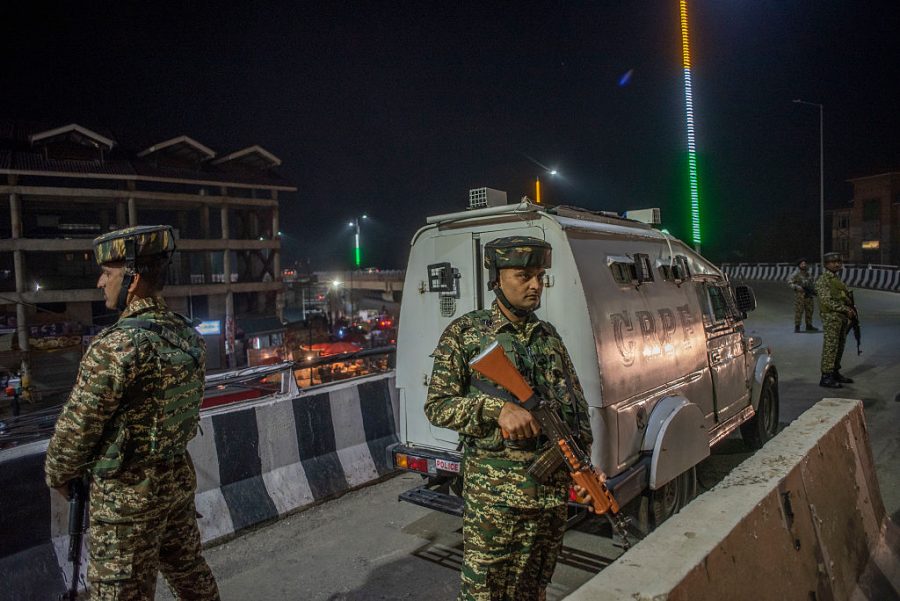At least 26 tourists were killed in a militant attack on the town of Pahalgam in Indian-administered Kashmir on Tuesday. Responsibility for the massacre at the popular tourist destination has been claimed on social media by a militant group called the Resistance Front (TRF), reportedly as a response to ‘Indian settlement’ in the region.
According to eyewitnesses, the militants verified the religion of their victims, before eliminating non-Muslims. The massacre was a throwback to the jihadist violence of the 1990s that saw the cleansing of Kashmir’s local Hindu population from the Muslim-majority region. The attack has overlapped with US vice president J.D. Vance’s trip to New Delhi, and Indian prime minister Narendra Modi’s visit to Saudi Arabia. The latter returned home ahead of schedule in the aftermath of what has become the most devastating militant manoeuvre in Kashmir since 2019.
Returning to a state of war and volatility is precisely what TRF has striven to orchestrate
The union territory of Jammu and Kashmir, a part of the Kashmir region claimed in its entirety by both India and Pakistan, had its special status and autonomy revoked by the Modi-led Bharatiya Janata Party (BJP) in August 2019. This was ostensibly to quell Islamist separatist militancy that was raging in the region. While Kashmir saw a significant reduction in terror attacks, in part thanks to the tight security around India hosting meetings of the G20 summit there in 2023, the heavy presence of the Indian army and its abuses have continued to encourage militancy. In addition to security personnel, these militants have continued to target Hindu and Sikh civilians.
TRF, which came into being after 2019’s constitutional abrogation, has claimed responsibility for numerous killings over the years, including of schoolteachers, pharmacists and jewellers, among other professionals, accusing them of being ‘collaborators and traitors’. Yesterday’s Pahalgam attack was not the first time the rebel group had launched raids where they interrogated victims on their religious identities before murdering non-Muslims. The attacks escalated last year ahead of elections for both the Jammu and Kashmir state legislature and the Lok Sabha, the lower house of the Indian parliament, as separatist militants sought to challenge the political status quo by rekindling aspirations of an Islamised Kashmir.
Aspirations of an Islamised Kashmir have historically been encouraged by the Pakistani army. It has sustained jihadist groups bound for Kashmir with the aim of fulfilling its avowed ‘bleed India with a thousand cuts’ strategy. Spearheading this strategy has been Lashkar-e-Taiba (LeT), the parent organisation of TRF, whose affiliates and allies have carried out numerous jihadist raids in India, including the raid on India’s parliament in New Delhi in 2001 and the coordinated four-day 2008 Mumbai attacks which left 175 dead.
To bolster recruitment for their jihad, these militant outfits have pushed for a radicalisation of the Kashmiri Muslim population in line with Pakistan’s foundational ‘two-nation theory’, which views the Hindus and Muslims of the subcontinent as perpetually opposed. That ideology was invoked in an address last week by Pakistan’s army chief General Asim Munir, reminding his compatriots that ‘we are different from the Hindus in every possible aspect of life’.
In the lead-up to India’s reversal of the region’s autonomy in 2019, which Pakistan already denied its own administered portion of Kashmir, the two countries briefly clashed in armed conflict. Since then, Islamabad has taken steps to wrap up its jihadist infrastructure after the international terror watchdog, the Financial Action Task Force, threatened it with sanctions. Pakistan has also undertaken its own political reengineering in Kashmir, bringing the disputed territories under its control. However, the ascendency of the hardline Islamist general Asim Munir to the position of army chief, spearheading the country’s all-powerful military, could signal a return to cross-border hostilities.
In India, the rise of Hindu nationalism, and Modi’s political deification, remain stumbling blocks in addressing the country’s security challenges. Grandiose vows against Pakistan are unlikely to be complemented by accountability over New Delhi’s intelligence failures. Instead of addressing any of the hard questions surrounding the Pahalgam attack, Modi and his confidante, Home Minister Amit Shah are likely to use the incident to rekindle the BJP’s decreasing popularity and cheerlead a military retaliation similar to 2019.
Returning to a state of war and volatility is precisely what TRF wants. They targeted tourists, the backbone of Kashmir’s economy, timing the manoeuvre to coincide with J.D. Vance’s arrival, similar to the 2000 Chittisinghpura massacre of 40 unarmed Sikhs, which took place during Bill Clinton’s visit to India.
The Pahalgam attack, carried out by a group that speaks a sophisticated language of ‘resistance’ against ‘settler-colonialism’, yet carries out brute Islamist violence against non-Muslims, has returned Kashmir to the global map of jihadism while the world’s eyes have been on Gaza and the Middle East. TRF and its backers hoped that providing an anti-colonial cover to the massacre of innocent civilians would win them sympathy similar to the celebration of Hamas’s bloodlust around the world. But just as Gazans are rising up against Hamas, Kashmiris too have rejected the jihad with protests and the closure of businesses in the immediate aftermath of the slaughter.
These protests are an offshoot of the economic gains that both Kashmir and India have made in recent years, safeguarding which would be in the best interests of both the union territory and the centre. For Pakistan, which itself is also reeling from an escalation in jihadi attacks, any continuation of the ‘good Taliban, bad Taliban’ policy to differentiate between outbound and inbound outfits will continue to backfire on the financially crippled state.







Comments